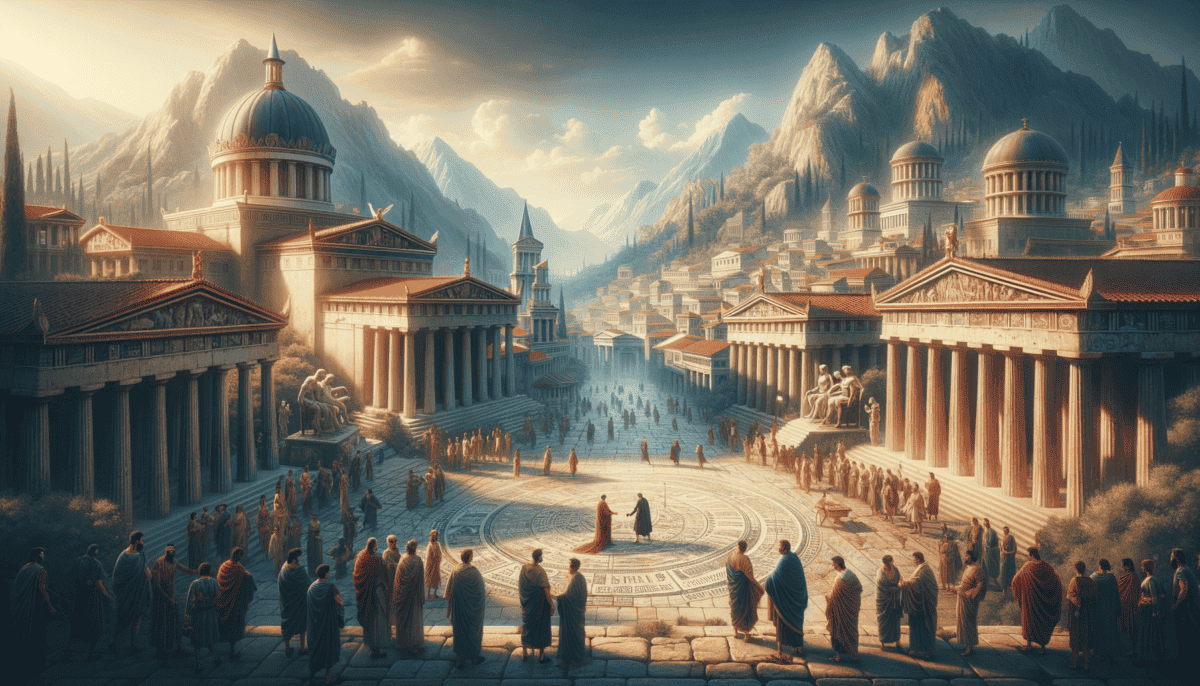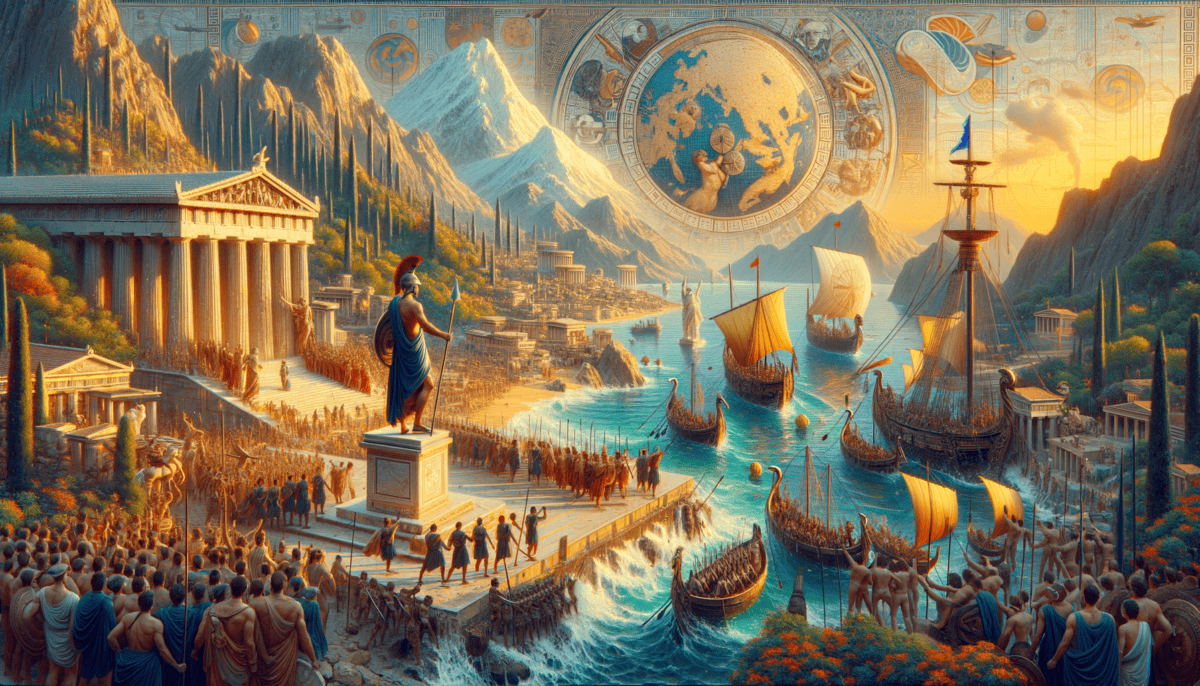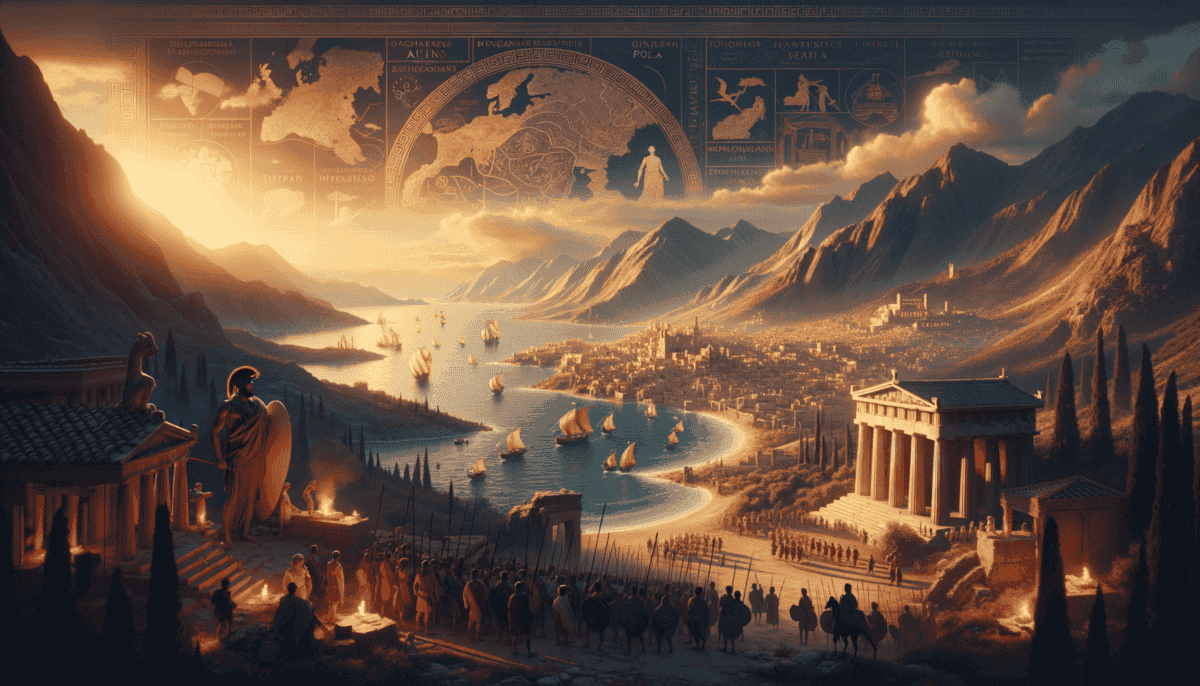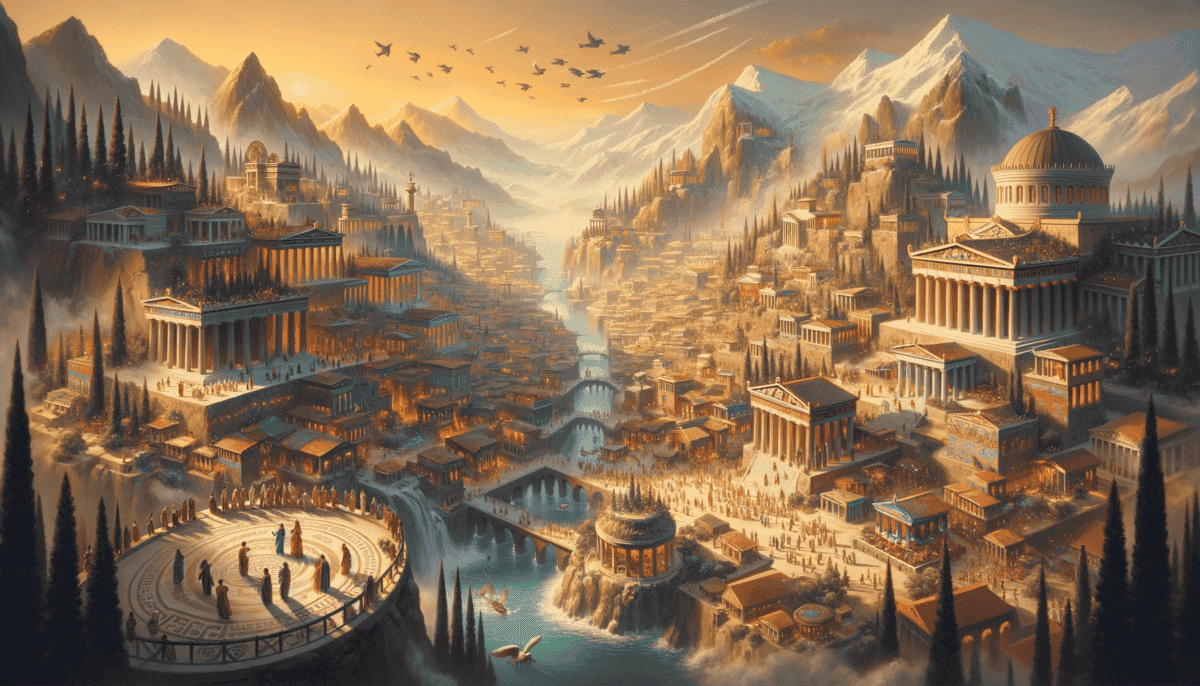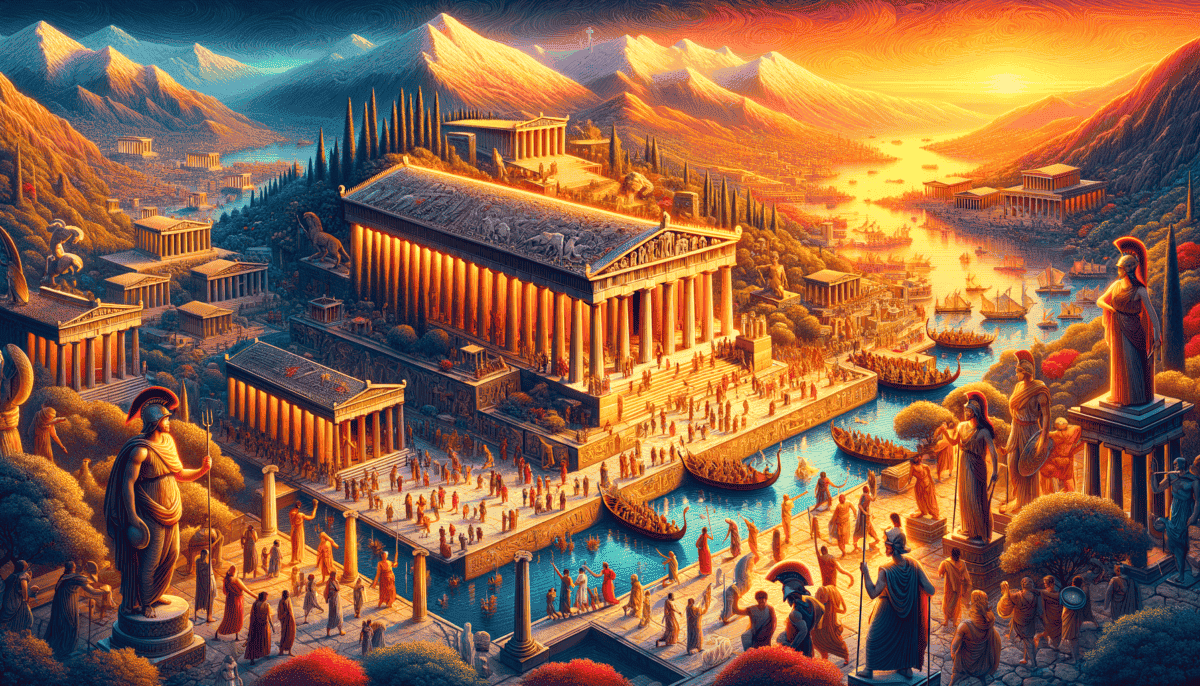The Land of Divided Kingdoms
Long ago, in a beautiful land called Greece, there lived many different groups of people. But this wasn't like the cities we know today. Each city was like its own tiny country! ️
Little Sophia stood at the top of Mount Olympus with her grandfather, looking down at the valleys below. "Why are all our cities so far apart?" she asked, her eyes wide with wonder.
Her grandfather smiled and pointed to the rocky mountains all around them. "You see these big mountains, little one? They're like nature's walls. They kept our cities separate, but that made each city special in its own way."
A Land Shaped by Mountains
Greece wasn't flat like a pancake. It was more like a giant playground with:
• Tall mountains that touched the clouds
• Deep valleys filled with farms
• Many small islands in the blue sea
• Rocky paths between cities
"But Grandfather," Sophia asked, "why didn't all the cities just become one big city?"
He chuckled. "Well, imagine if you had to walk over these mountains every day just to go to school. That's what people back then would have had to do! The mountains made it hard to travel, so each city grew up on its own."
Life in the Polis
Each city-state was proud and different. Think of them like special recipe cookies – they might all be cookies, but each one has its own flavor!
In Athens, people loved to learn and talk about big ideas. In Sparta, they were proud of being strong warriors. Corinth was famous for making beautiful pots and trading with other cities.
“Each city is like a star in the night sky,” Grandfather explained. “Different and bright in its own way.”
Growing Together, Standing Apart
Even though the cities were separate, they shared many things:
- They spoke the same language
- They believed in the same gods
- They loved sports and held the Olympic Games
- They traded goods with each other
"Look there!" Sophia pointed to a group of people walking along a mountain path. "Where are they going?"
"They're probably traders," Grandfather explained. "Even though our cities are separate, we still need each other. Some cities have olive oil, others have wine or pottery. By trading, everyone gets what they need."
As the sun began to set, casting long shadows across the mountains, Sophia and her grandfather started their journey home. "Remember," he said, patting her head, "sometimes being apart helps us grow stronger in our own special ways."
The mountains of Greece still stand today, telling the story of how a land divided by nature became united by culture. Each city-state wrote its own chapter in history, but together they created a story that we still read today.
The wind whistled through the ancient olive trees as Sophia and her grandfather descended the mountain. She couldn't wait to learn more about these amazing city-states, especially the exciting story of Athens and its new ideas about how people should rule themselves…
Athens Rises – Democracy’s First Heartbeat
The morning sun peeked over the Acropolis as young Sophia and her grandfather walked through the busy streets of Athens. People rushed around them, heading to a special meeting called the Assembly. ️
“What’s happening today, Grandfather?” Sophia asked, watching the excited crowds.
“Today is special, little one. The people are going to vote on new laws for our city. In Athens, we believe everyone should have a say!”
The Birth of People Power
Long ago, Athens was very different. Kings made all the rules. But then came a wise man named Solon. He thought everyone should help make decisions, not just the rich and powerful.
Sophia watched as people dropped colored stones into big clay pots. “What are they doing?” she asked.
“They’re voting!” Grandfather explained. “White stones mean ‘yes,’ and black stones mean ‘no.’ This is how we make choices together.”
Changes Come to Athens
Another important leader was Cleisthenes. He made big changes that made Athens even more fair:
- All free men could vote
- People met regularly to make decisions
- Everyone had to follow the same laws
- Citizens took turns being leaders
“In Athens, we believe that many minds are better than one,” Grandfather said proudly. “Everyone has good ideas to share!”
A New Way of Living
Life in Athens became very different from other cities. People loved to:
️ Talk about ideas
Learn new things
Solve problems together
Watch plays and tell stories
“But Grandfather,” Sophia wondered, “what if people disagree?”
He smiled. “That’s the beauty of it! We talk, we listen, and we find ways to work together. Sometimes we even use pieces of broken pottery to vote on whether to send bad leaders away!”
Growing Stronger Together
As more people joined in making decisions, Athens grew stronger. The city became famous for:
✨ Beautiful buildings
✨ Smart thinkers and teachers
✨ Fair laws
✨ Happy citizens
The sun was high in the sky now as Sophia and her grandfather watched people leaving the Assembly. Some looked happy, others disappointed, but all of them had been heard.
“Remember,” Grandfather said, “democracy isn’t always easy. But like a garden, if we tend it carefully, beautiful things can grow.”
As they walked home, Sophia noticed a group of strong-looking visitors in the market. “Who are they?” she asked. “They look different from us.”
“Ah,” Grandfather smiled mysteriously, “those are Spartans. They have their own special way of living. Very different from our Athens…”
Warriors of the Red Cloak
Little Alexios stood tall and straight, his heart beating fast. Today was his seventh birthday – but in Sparta, this wasn’t a day for games and treats.
“From today, you begin your training as a true Spartan,” his father said, placing a red cloak around his shoulders.
Life in the Barracks
Unlike children in other Greek cities, Spartan boys left home at age seven. They moved to special houses called barracks to learn to be warriors.
“But I’ll miss my mother,” Alexios whispered to his friend Theron.
“A true Spartan is brave,” Theron replied. “Remember what they tell us – ‘Come back with your shield or on it.'”
Growing Up Strong
Every day in Sparta followed a strict schedule:
- Wake up before sunrise
- Exercise and wrestling
- Practice with weapons
- Learn to be sneaky and clever
- Train to work as a team
“We Spartans don’t build big walls,” their trainer said. “Our warriors are our walls!”
A Different Kind of City
While Athens had beautiful buildings and art, Sparta was different:
⚔️ Everyone trained to fight
♂️ Sports were very important
They didn’t like long talks
Everyone shared everything
Two Kings and Five Friends
Sparta had a special way of running things. Instead of one king, they had two! They also had five special helpers called Ephors who made sure everyone followed the rules.
“Why do we need two kings?” Alexios asked during dinner.
“So one can lead us in war while the other stays to protect our city,” the trainer explained.
Living the Spartan Way
Be strong
Help others
Never give up
️ Protect Sparta
As months passed, Alexios grew stronger. He learned to:
– Run for miles without stopping
– Fight with spears and shields
– Survive in the wild
– Work with his fellow warriors
One evening, while resting after training, Alexios and his friends heard exciting news. Messengers had arrived from Athens with important words about a new danger from far away.
“The Persians are coming,” whispered the older boys. “They want to take over all of Greece…”
Alexios gripped his red cloak tighter. He knew that soon, all his training would be put to the test. But would Sparta and Athens – such different cities – be able to work together?
United We Stand
The sun rose over the Greek hills as messengers raced between Athens and Sparta. A huge army was coming!
The Persian Threat
“King Darius of Persia wants to rule all of Greece,” announced the messenger in Sparta’s main square. Young Alexios listened with wide eyes.
“But Athens and Sparta don’t like each other,” whispered Theron to Alexios. “How can we fight together?”
The Battle of Marathon
The first big fight happened at a beach called Marathon. The Athenians sent a runner named Pheidippides to ask Sparta for help. He ran 150 miles in just two days! ♂️
“All Greeks must stand together,” said the Athenian leader. “We are stronger as friends than enemies!”
The Athenians fought bravely at Marathon. They used clever tricks to beat the bigger Persian army:
- They waited until the right moment to attack
- They ran super fast at the enemy
- They worked together as a team
- They never gave up
The Famous Run
After winning the battle, a soldier ran all the way to Athens to share the good news. That’s why today we have marathon races!
An Even Bigger Fight
Ten years later, a new Persian king named Xerxes brought an even bigger army. This time, Sparta joined the fight right away!
Alexios, now older and stronger, stood with his fellow Spartans at a narrow path called Thermopylae. King Leonidas led 300 brave Spartan warriors.
⚔️ The battle lasted three days
️ The Spartans fought like heroes
They held back thousands of enemies
♂️ They gave other Greeks time to get ready
Greeks Unite!
“Look!” shouted Alexios as ships appeared in the bay. “The Athenian navy has come!”
Working together, the Greeks had a clever plan:
– The Spartans would fight on land
– The Athenians would fight on sea
– Other Greek cities sent helpers too
– Everyone did their part
Victory for Greece
The plan worked! The Persian ships couldn’t beat the quick Greek boats. The Persian army had to go home.
Amazing Achievement: Small Greek cities beat the biggest army in the world by working together!
That night, Alexios sat with friends from many Greek cities around a victory fire. “We’re different,” he said, “but we’re all Greeks. That makes us strong.”
On a hill above Athens, people started planning something new – a beautiful temple called the Parthenon. It would show everyone how great Greece had become…
A Time of Glory
The sun shone brightly on Athens. The city was full of happy sounds and busy people.
A Special Leader
A man named Pericles became the leader of Athens. He had big dreams for the city!
“Our city should be beautiful,” Pericles told the people. “Let’s build amazing things!”
Building Beautiful Things
Sofia, a young girl, watched workers build the Parthenon. It was a huge temple on top of a hill. ️
“Look how the marble shines in the sun!” Sofia said to her friend Marcus. “It’s like it’s made of gold!”
All around Athens, new buildings went up:
- Beautiful temples with tall columns
- Places to watch plays and hear music
- Schools for learning
- Sports areas for games
Smart People Everywhere
Sofia loved listening to the wise people who taught in the city. They asked big questions like:
What makes someone good?
How should people live together?
What is the best way to learn?
How does our world work?
Art and Stories
Artists made pretty vases with pictures that told stories. Theater became very popular too!
“Today we’ll see a funny play,” Sofia’s mother said. “And tomorrow, a sad one that will make us cry.”
Learning Was Important
Boys went to school to learn reading, writing, and music. They exercised their bodies too!
Sofia wished girls could go to school too. Some girls learned at home instead:
They learned to read stories
They played music
They made beautiful art
They learned to run a household
Sharing Ideas
People came from far away to learn in Athens. The city was like a big school!
“Athens is a teacher to all of Greece,” Pericles would say proudly.
A Special Time
One evening, Sofia sat with her family on their rooftop. They watched the sunset turn the Parthenon pink and gold.
“Our city is so beautiful,” Sofia said. “I hope it stays this way forever.”
But dark clouds were gathering. Some Greek cities were getting jealous of Athens. They didn’t like that Athens was becoming so powerful…
When Friends Become Enemies
Dark clouds gathered over Athens. The happy times were about to change. Something big was coming. ️
Two Strong Cities
Athens and Sparta were the strongest cities in Greece. But they were very different.
Sofia noticed worried faces in the market. “Why is everyone so scared?” she asked her father.
“Sparta thinks we’re becoming too powerful,” her father said. “They want to stop us.”
The Big Fight Begins
The war started slowly, then grew bigger. People called it the Peloponnesian War. ⚔️
Many Greek cities picked sides:
- Some joined Athens
- Some joined Sparta
- Some tried to stay out of the fight
- Some switched sides during the war
Hard Times in Athens
Sofia watched as life in Athens changed:
People had to live inside the city walls
Many got sick
Food became hard to find
Families lost loved ones in battle
A Long, Hard War
“How long will this last?” Sofia asked her mother.
“Nobody knows,” her mother answered. “Wars can last a very long time.”
Everything Changes
The beautiful buildings started to look old. The plays stopped. The teachers left.
“Remember when we watched the sunset from our roof?” Sofia asked her brother. “Everything seemed perfect then.”
The End of the War
Finally, Sparta won the war. Athens had to:
️ Take down their city walls
⛵ Give away their ships
Let Sparta be the boss
Promise to follow Sparta’s rules
What We Learned
Many years later, Sofia told her grandchildren about the war. She taught them important lessons:
• Being too proud can cause problems
• Fighting with friends hurts everyone
• Working together is better than fighting
A New Beginning
The Greek city-states were never the same after the war. But something amazing happened.
The ideas from Athens’s Golden Age lived on. People still learn about them today!
“Our buildings may fall,” Sofia told her grandchildren, “but our ideas will last forever.”
And she was right! Today, we still use many ideas from ancient Greece:
️ We vote in elections
We watch plays in theaters
️ We build beautiful buildings
We ask big questions about life
The Greek city-states taught us that working together is better than fighting. When people share ideas and help each other, amazing things can happen!


